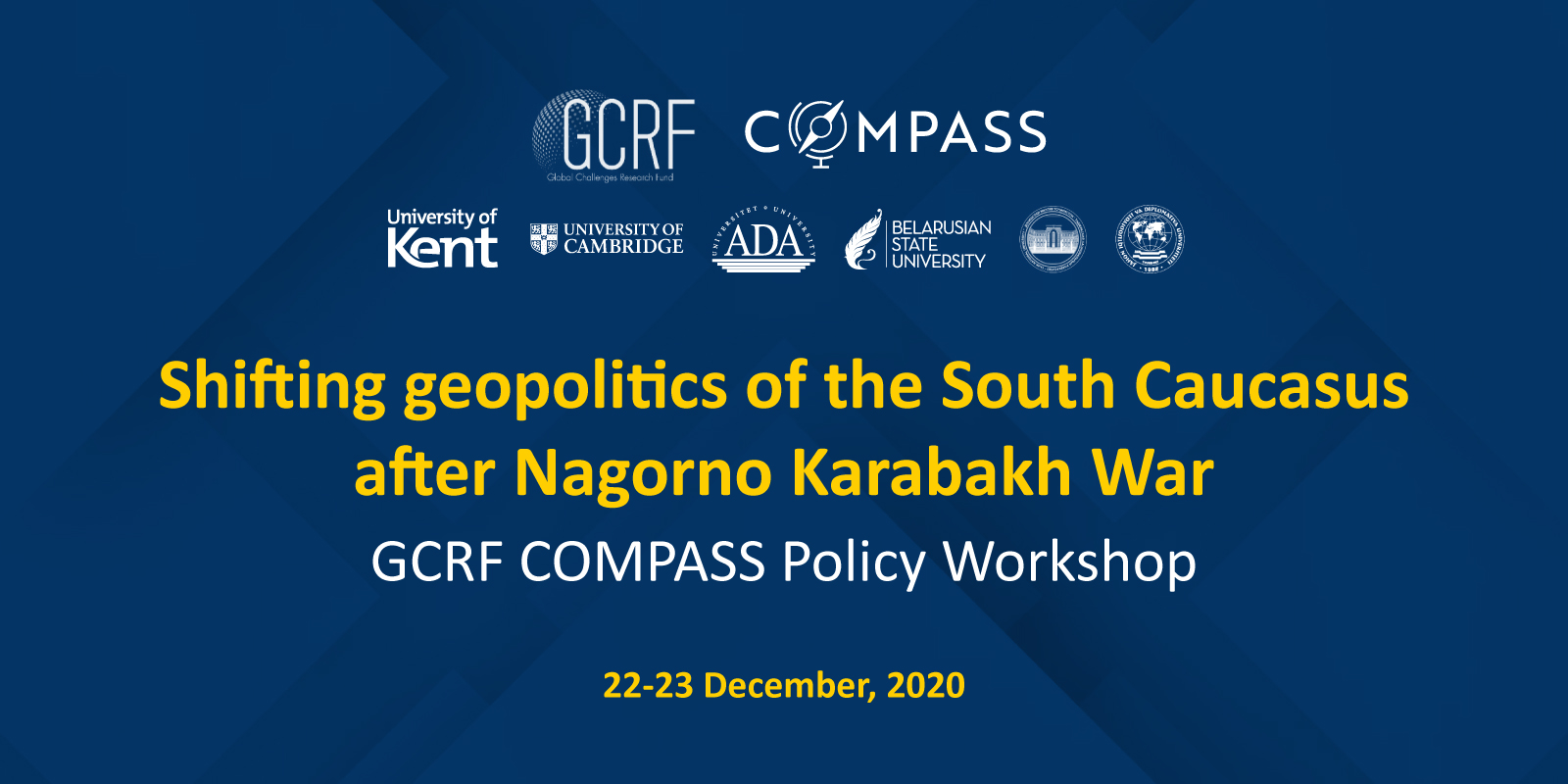MEDIA
GCRF COMPASS and ADA University are pleased to announce open registration for two half-day GCRF COMPASS Policy Workshops on December 22 and 23, 2020. COMPASS Policy Workshop “Karabakh conflict and implications for regional balance of power” will be dedicated to the Nagorno-Karabakh conflict and geopolitical shift following the 44 days of war.
In late September 2020, three decades long Nagorno-Karabakh conflict went into the most violent phase since 1994. Azerbaijan and Armenia were able to reach a new cease-fire agreement through the unilateral mediation of Russia, that resulted in return of occupied territories under the control of Azerbaijan, entrance of the Russian peacekeeping force into the region of Nagorno-Karabakh, establishment of peacekeeping operation for five years with the possibility of subsequent prolongation and obligations to reopen regional communications between Armenia and Azerbaijan and most likely with Turkey.
For two days, the most distinguished experts and academicians in the field will be presenting their opinions on the most touching issues in geopolitics of the South Caucasus before and after the war, foreign policy and security issues of the region and beyond.
Full COMPASS Policy Workshop program
22 December 2020
15.00 – 15.10 | Welcome and introduction Mr Fariz Ismailzade, ADA University Executive Vice Rector and COMPASS Project Associate |
15.10 – 17.10 | Panel: Strategic overview of the South Caucasus from different perspectives: Western, Turkey and Russian Strategies for the South CaucasusProfessor Elena Korosteleva, Professor of International Politics, University of Kent and GCRF COMPASS Principal Investigator Dr Farid Shafiyev, Chairman of the Center of Analysis of International Relations Mr Mattew Brysa, Former Co-chairman of the OSCE Minsk Group and ex-US Ambassador to Azerbaijan Dr Svante E. Cornell, Director of Central Asia-Caucasus Institute & Silk Road Studies Program Joint Center
Dr Ayca Ergun, Assistant Professor, METU (Turkey) |
17.10-17.30 | Q&A and Closing remarks Mr Fariz Ismailzade |
23 December 2020
15.00 – 15.10 | Welcome and introduction Mr Fariz Ismailzade, ADA University Executive Vice Rector and COMPASS Project Associate |
15.10 – 17.10 | Panel: Perspectives on the geopolitical developments & environment in the South Caucasus after the Nagorno-Karabakh WarDr Mamuka Tsereteli, Senior Fellow with the Central Asia-Caucasus Institute & Silk Road Studies Program Joint Center, USA Dr Anar Valiyev, Dean of School of Public and International Affairs, ADA University and COMPASS Project Associate Dr Michael Doran, Senior fellow at Hudson Institute, USA Dr Mehmood Ul Hassan Khan, Director of Geopolitics/Economics at the Defence Journal, Pakistan Mr Luke Coffey, Director of the Allison Center of Foreign Policy Studies at Heritage Foundation, USA |
17.10-17.30 | Q&A and Closing remarks Mr Fariz Ismailzade |
The program targets Azerbaijani and international students, post-graduates with an ambition to become experts in regional politics, work as diplomats, in international organizations, and young professionals in the field that are interested to engage in a fruitful and thought-provoking discussion with experts in the field.
The Program starts on 22 December 2020 and will be held for two consecutive days (22-23 December 2020) from 15:00 to 17:30 online.
To register for the program email to ceeus@ada.edu.az no later than December 21, 2020 15.00 stating your Full name and affiliation. Registration email should contain the subject line: "COMPASS Policy Workshop". Only registered participants will receive an access link.
The Policy Workshop is conducted within the framework of the GCRF UKRI COMPASS project is an ambitious UK government capacity-building initiative, aiming to extend UK research globally, to address the challenges of growth and sustainability in the developing countries. Notably, the COMPASS project at the University of Kent, together with Cambridge University as its research partner, seeks to establish ‘the hubs of excellence’ at the top-level HEIs in Belarus, Azerbaijan, Uzbekistan, and Tajikistan, to enable them to act as nodes for knowledge sharing and transfer along the following three dimensions, namely research integration, impact governance, and sustainable communities.
